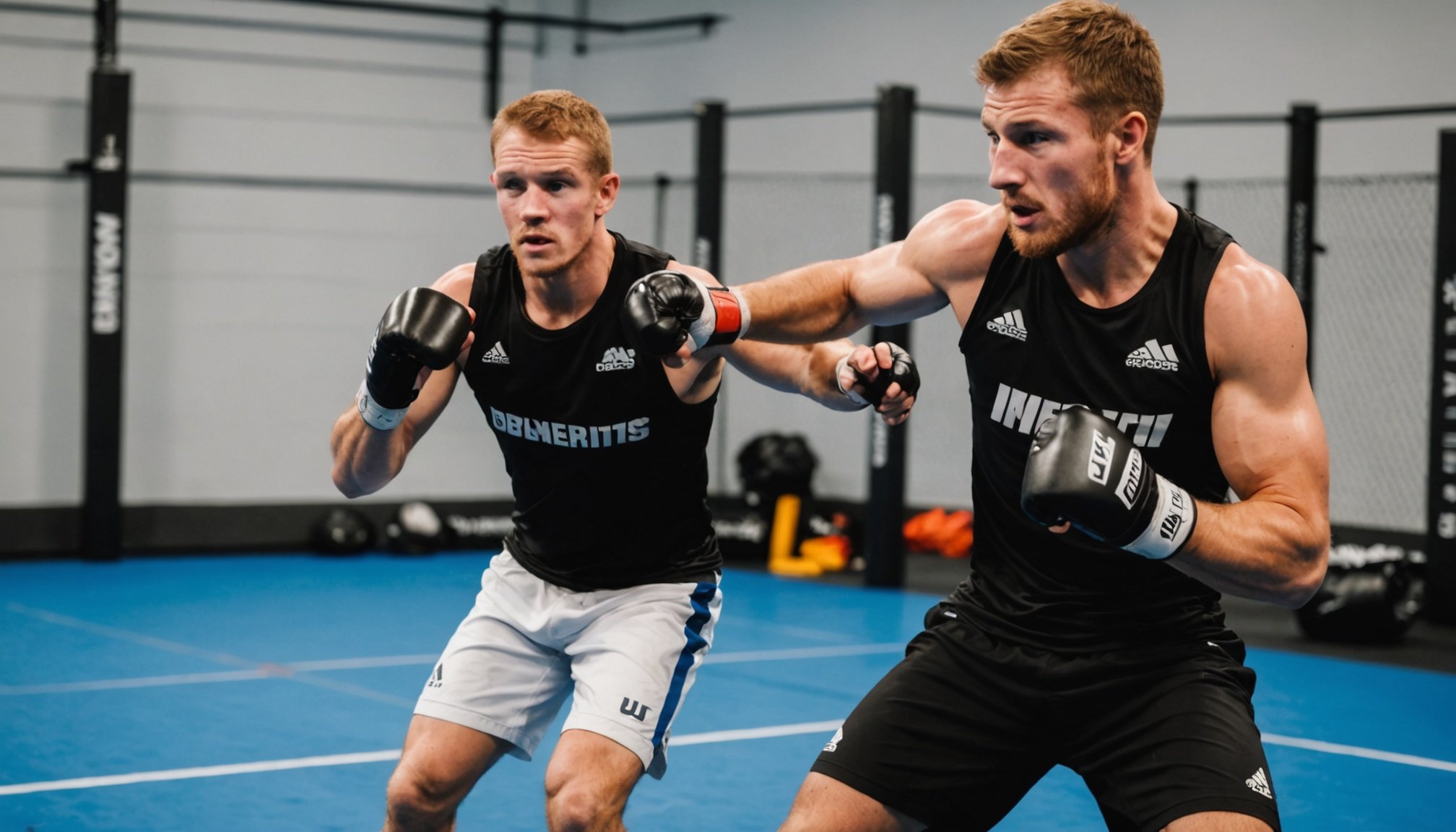Understanding Performance Anxiety in Combat Sports
Performance anxiety in combat sports is a common yet complex issue that affects athletes in various ways. It can be defined as the experience of intense worry or fear about performing in a competitive context. For many athletes, especially those in the UK, these feelings can intensify due to the unique pressures of combat sports, which require a high degree of physical and mental endurance.
Combat sports athletes often face unique challenges due to the nature of their sport. The stakes of injury and the intense one-on-one competition can exacerbate feelings of anxiety. Additionally, the expectations to perform at a high level can lead to significant mental health issues, including stress and reduced self-confidence. Training sessions may become impacted, as athletes might hold back to avoid potential failure, leading to a lack of progress or technique refinement.
Additional reading : Elevate your defense: cutting-edge shadowboxing strategies for uk kickboxers
The impact of performance anxiety is not limited to psychological distress; it influences tangible outcomes in both training and competition. Anxiety can manifest in muscle tension, reduced focus, and impaired decision-making abilities, all of which are crucial in combat scenarios. Recognising and addressing these factors is essential for athletes aiming to enhance performance and maintain mental health throughout their competitive journey. By understanding and tackling performance anxiety, combat sports athletes can improve both their mental resilience and athletic success.
Techniques for Developing Mental Resilience
Improving mental resilience is vital for sustaining performance and effective coping strategies within competitive scenarios.
Also to see : Unlocking peak performance: tailored kickboxing training plans for uk women aligned with menstrual cycle insights
Mindfulness and Visualization Techniques
Mindfulness meditation offers significant benefits for athletes aiming to improve mental resilience. It helps in maintaining focus and reducing anxiety. Visualization serves as another powerful tool, enabling athletes to rehearse success and ideal scenarios, enhancing not only performance but also confidence. Imagine visualising every step of a race before it happens, which prepares the mind and builds a positive outlook.
To incorporate mindfulness, one simple exercise is focused breathing — dedicate just five minutes daily to concentrate on breathing, noticing each inhale and exhale. Over time, this practice enhances self-awareness and concentration.
Breathing Strategies
Deep breathing techniques are instrumental in managing acute anxiety. Their role during competitions can’t be understated as they help maintain composure and focus. Simple exercises like box breathing (inhaling, holding, exhaling, and pausing for equal counts) can be practiced regularly to enhance breath control.
Cognitive Behavioral Approaches
Cognitive Behavioral Therapy (CBT) methods are effective in identifying and challenging negative thought patterns. Reframing anxious thoughts into positive affirmations can significantly boost confidence levels. Integrating CBT into training routines might involve reflecting on positive outcomes and setting realistic goals, which frame experiences constructively.
Expert Insights and Research on Mental Resilience
Understanding mental resilience is crucial for athletes, especially within the context of high-pressure environments like combat sports. Recent research studies have focused extensively on anxiety management, revealing fascinating insights. For instance, a study in the “Journal of Sports Sciences” highlighted that mental conditioning can significantly reduce performance anxiety, a frequent challenge for combat athletes.
When exploring mental conditioning’s role, sports psychologists provide valuable expert advice. Dr. Lucy Hargreaves, a leading sports psychologist, notes that consistent practice of mental conditioning techniques – such as visualisation and controlled breathing – can fortify an athlete’s resilience under pressure. Her interviews emphasize that these methods, deeply embedded in routine training, enhance focus and reduce anxiety spikes during competitions.
In terms of practical recommendations, UK athletes can benefit from integrating structured mental conditioning protocols into their training regimens. This includes regular sessions with a qualified sports psychologist and engagement in cognitive behavioural strategies. By doing so, athletes can better manage stress responses, improving both performance and overall well-being.
The convergence of expert advice, thorough research studies, and practical applications marks a significant step forward in the understanding and enhancement of mental resilience in sports.
Personal Stories and Testimonials from Athletes
Personal stories from athletes often reveal the profound impact of sports on personal growth and overcoming challenges such as anxiety. These tales reflect resilience, determination, and the transformation of obstacles into opportunities for self-improvement.
Case Studies
Consider UK combat sports athletes who have battled and conquered performance anxiety. Many have adopted various techniques to boost mental resilience. For example, practicing mindfulness and visualization techniques have been effective in helping athletes manage their stress levels. Such methods not only refined their performances but also improved their overall well-being, paving the way for enhanced personal growth.
Athletes frequently share lessons learned, emphasizing the importance of persistence and self-belief. Their advice often revolves around understanding the root causes of anxiety and tackling them head-on with determination and the right strategies. Embracing failure as a learning opportunity is another common piece of wisdom shared in these testimonials.
Community Support and Resources
Community support plays a significant role in managing anxiety for athletes. Peer support groups and resources like workshops offer a haven for sharing experiences and tips. Several UK organizations focus on mental health in combat sports, providing invaluable support through educational sessions and counselling, affirming that athletes are never alone in their journey towards mental resilience.
Practical Exercises for Mental Conditioning
Engaging in mental conditioning exercises is crucial for enhancing performance techniques and maintaining mental health in high-pressure situations.
Incorporating daily routines into practice and competition preparation can significantly boost an athlete’s mental resilience. Exercises such as visualisation, where athletes mentally rehearse successful outcomes, can be incredibly effective. By dedicating a few minutes each day, athletes can reinforce positive patterns and clear strategies, allowing for improved focus during competition.
Group exercises are another invaluable tool. They are designed to build resilience within training teams. Activities like team-based problem-solving games encourage communication and collaboration. They help individuals to consolidate their mental strength and encourage camaraderie, which is vital in high-pressure environments.
Moreover, long-term strategies are essential for maintaining mental health over extended periods. Incorporating mindfulness practices, such as meditation and breathing exercises, can help reduce stress and anxiety. Establishing a support network with coaches or mental health professionals also offers a safety net for athletes, providing guidance and relief when pressure mounts.
Ultimately, adopting these performance techniques fosters a well-rounded mental conditioning approach, preparing athletes to tackle both the demands of the sport and the challenges of maintaining overall mental well-being.
Further Reading and Resources
For those looking to delve deeper into the realm of mental resilience and performance anxiety, a plethora of resources are available. Consider exploring recommended reading such as books like “Mindset: The New Psychology of Success” by Carol S. Dweck, and “The Champion’s Mind: How Great Athletes Think, Train, And Thrive” by Jim Afremow. These works provide valuable insights into the psychological strategies employed by top performers.
Online training tools and workshops focused on mental conditioning are readily accessible. Platforms like Coursera and Udemy offer courses on sports psychology and mental performance, catering to both beginners and seasoned athletes. These courses often feature interactive elements and real-life scenarios that engage learners effectively.
Additionally, seeking the guidance of mental health professionals can greatly enhance personal growth in sports. Specialists in sports psychology, who focus on performance anxiety and mental strength, are instrumental in devising personalized strategies. Consult directories like Psychology Today for detailed contact information of professionals in your area.
Continued engagement with these resources fosters a supportive environment, equipping individuals with the tools necessary to navigate the complexities of athletic mental challenges. Embracing these educational opportunities can bolster one’s journey towards enhanced psychological endurance.











